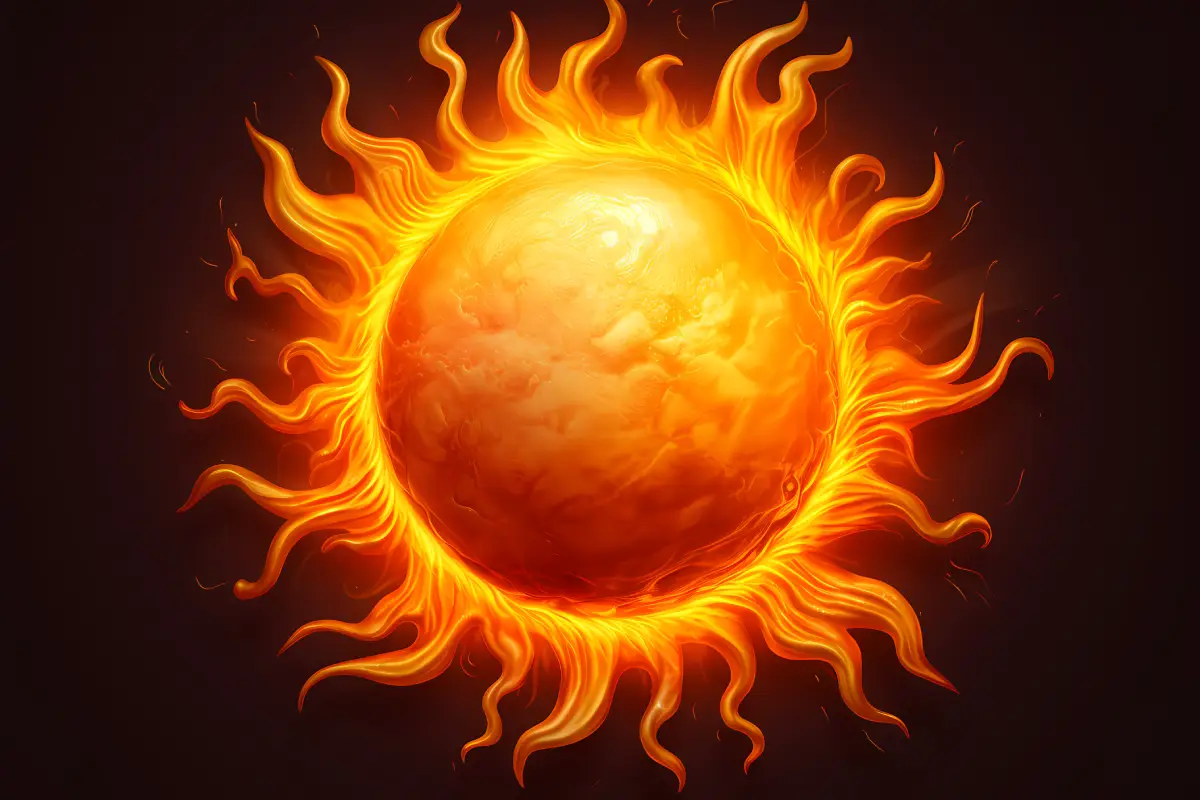Table of Contents
The Sun is one of the most important planets in astrology, often referred to as the “King” of the solar system. It represents the core of our identity, ego, vitality, and purpose. The Sun symbolizes the self, the conscious mind, and our personal will. It governs how we project ourselves to the world, our sense of pride, leadership qualities, and our desire for recognition. In both Western and Vedic astrology, the Sun plays a vital role in shaping our personality, emotions, and life events, and is seen as a central force that influences our overall life path.
The Sun’s placement in the birth chart is crucial as it defines our ambitions, goals, and personal drive. It is associated with self-expression, individuality, and how we pursue success and happiness. While a strong Sun can indicate a confident and powerful personality, an ill-placed Sun might lead to issues with self-esteem, ego, and a sense of direction in life.
The Sun’s Role in Vedic and Western Astrology
Impact on Personality
The Sun represents self-confidence, authority, and leadership. Individuals with a strong Sun in their chart are likely to be ambitious, charismatic, and commanding. They have an innate sense of self-worth and often gravitate toward leadership roles. They seek recognition and take pride in their achievements.
On the contrary, if the Sun is weak or afflicted in the chart, the person may struggle with low self-esteem, indecisiveness, and a lack of direction. They may feel overshadowed by others and find it difficult to assert themselves.
Horoscope & House Association
In Vedic astrology, the Sun rules over the zodiac sign of Leo (Simha). It is exalted in Aries (Mesha), where its energy is at its peak, representing strong willpower, confidence, and initiative. The Sun is debilitated in Libra (Tula), where its influence is weakened, leading to issues related to self-worth and balance. The Sun’s placement in the 1st house is considered very strong as it directly influences personality, appearance, and how a person is perceived by others. In the 10th house, it contributes to career success, status, and authority.
In Western astrology, the Sun also rules Leo and symbolizes individuality, personal identity, and self-expression. Its position in the chart reveals how a person shines in the world and what drives them to achieve their desires.
Physical and Emotional Influence
Physically, the Sun represents the heart, eyes, and overall vitality. A strong Sun gives a person good health, energy, and a radiant appearance. Conversely, a weak Sun might lead to health problems related to the heart, vision, or general vitality. In terms of emotions, the Sun is associated with positivity, enthusiasm, and joy. If the Sun is afflicted, the person may suffer from ego-related issues, arrogance, or a tendency to seek approval from others to feel validated.
Mythological Significance of the Sun
In Hindu mythology, the Sun is personified as Surya, the god of light and day. Surya is depicted riding a chariot driven by seven horses, representing the seven colors of light and the seven days of the week. He is worshipped as the source of all life and energy, and is seen as a powerful deity who brings prosperity, health, and wisdom. The ancient Vedic texts describe Surya as the embodiment of truth and justice, often associated with dharma (righteousness).
Surya’s importance is highlighted in the Gayatri Mantra, one of the most sacred Vedic hymns, which is dedicated to the Sun and seeks his blessings for wisdom and enlightenment. Festivals such as Makar Sankranti and Chhath Puja are celebrated in honor of the Sun god, emphasizing his cultural and religious significance in Indian tradition.
In Greek mythology, the Sun is represented by Helios, the god who drove his chariot across the sky, bringing daylight to the Earth. The Romans later associated the Sun with Apollo, the god of music, prophecy, and healing. Both traditions highlight the Sun’s life-giving properties and its association with health, wisdom, and power.
Astrological Characteristics of the Sun
Energy Type
The Sun is considered to have masculine energy in astrology. Its energy is warm, radiant, and expansive, symbolizing action, ambition, and leadership. It governs the yang or active aspects of our personality, pushing us toward achievement, recognition, and outward expression. The Sun’s energy promotes confidence and self-awareness, encouraging individuals to take the initiative and pursue their goals with vigor.
Planetary Period (Dasha)
In Vedic astrology, the Sun’s Mahadasha lasts for 6 years. During this period, a person experiences events that shape their identity, self-expression, and leadership abilities. A favorable Sun Mahadasha brings success, recognition, and personal growth. Individuals may rise to positions of authority, gain respect, and achieve their goals.
However, if the Sun is weak or afflicted during its Mahadasha, the person may face difficulties with self-expression, ego clashes, and struggles in leadership roles. Health issues related to vitality and the heart may also arise.
Conjunctions and Aspects
The Sun’s conjunctions and aspects with other planets can greatly influence its effects. When the Sun is conjunct with Mercury, it enhances intellect and communication skills, making the person articulate and witty. This is commonly known as the Budhaditya Yoga and is considered highly auspicious.
When the Sun is conjunct with Mars, it boosts courage, confidence, and assertiveness, but can also lead to aggression if not well-balanced. Conjunction with Saturn, on the other hand, can create tension between authority and discipline, often resulting in power struggles or a clash between personal desires and responsibilities.
Aspects from benefic planets like Jupiter can enhance the Sun’s positive traits, while malefic aspects from planets like Rahu or Ketu may diminish its strength, causing ego problems, lack of clarity, and confusion about one’s purpose.
The Sun in Different Rashis (Zodiac Signs)
- Aries (Mesha): The Sun is exalted in Aries, bringing confidence, leadership, and initiative. Individuals with this placement are courageous, ambitious, and natural leaders.
- Taurus (Vrishabha): The Sun in Taurus emphasizes stability and material security. These individuals may be practical, focused on long-term goals, but could struggle with a rigid approach to change.
- Gemini (Mithuna): The Sun in Gemini enhances communication skills, intellect, and curiosity. These individuals are often social, witty, and quick learners, but may lack focus or consistency.
- Cancer (Karka): In Cancer, the Sun is sensitive and emotionally driven. These individuals value family, nurturing, and security but may struggle with emotional vulnerability and mood swings.
- Leo (Simha): The Sun rules Leo, and this placement signifies strong leadership, self-confidence, and charisma. These individuals are ambitious, expressive, and seek recognition and respect.
- Virgo (Kanya): The Sun in Virgo emphasizes practicality, precision, and service. These individuals are analytical, detail-oriented, and strive for perfection, often excelling in professions requiring focus.
- Libra (Tula): The Sun is debilitated in Libra, leading to difficulties in self-expression and decision-making. Individuals may struggle with balancing their own needs with those of others, but they are diplomatic and cooperative.
- Scorpio (Vrishchika): The Sun in Scorpio brings intensity, passion, and transformative energy. These individuals are determined, focused, and possess a deep emotional depth, but can also be secretive or controlling.
- Sagittarius (Dhanu): The Sun in Sagittarius promotes optimism, idealism, and a love for knowledge. These individuals are philosophical, adventurous, and seek truth and higher purpose.
- Capricorn (Makar): The Sun in Capricorn emphasizes discipline, responsibility, and ambition. These individuals are hardworking, goal-oriented, and often achieve success through perseverance.
- Aquarius (Kumbh): In Aquarius, the Sun fosters a sense of individuality and social responsibility. These individuals are innovative, progressive, and focused on humanitarian causes, though they may struggle with detachment.
- Pisces (Meena): The Sun in Pisces creates a compassionate and intuitive nature. These individuals are creative, empathetic, and spiritually inclined, but may struggle with boundaries and practical decision-making.
Remedies for Weak or Malefic Sun
If the Sun is weak or malefic in a person’s chart, it can lead to problems related to ego, health, and personal identity. There are several remedies that can strengthen the Sun’s influence and mitigate its negative effects:
- Gemstone: Wearing a Ruby (Manikya) is considered auspicious for strengthening the Sun. It should be worn in consultation with a qualified astrologer, ideally in a gold ring on the ring finger of the right hand.
- Mantras: Chanting the Surya Beej Mantra or the Gayatri Mantra can help reduce the malefic effects of the Sun and enhance its positive attributes.
- Charity and Donations: Donating wheat, jaggery, or red-colored items on Sundays is believed to appease the Sun. Additionally, offering water to the Sun in the early morning (Surya Arghya) is a popular remedy.
- Fasting: Observing a fast on Sundays and consuming only one meal after sunset can strengthen the Sun’s influence.
- Sun Salutations (Surya Namaskar): Performing Surya Namaskar, a sequence of yoga poses, is beneficial for enhancing the Sun’s positive energy in the body and mind.
- Prayers to Surya Dev: Regular prayers to Surya Dev, especially during sunrise, help strengthen the Sun’s position in the chart. Visiting temples dedicated to the Sun god, like the Konark Sun Temple in Odisha, is also considered beneficial.
Conclusion
The Sun, as the planet of identity, vitality, and ego, holds a pivotal place in both Vedic and Western astrology. It governs our core personality, leadership qualities, and how we project ourselves in the world. A well-placed Sun brings confidence, success, and recognition, while a weak or afflicted Sun can lead to self-doubt, ego struggles, and health issues. Understanding the Sun’s placement in the birth chart can offer profound insights into our personal strengths, challenges, and life purpose. By harnessing the Sun’s energy, individuals can achieve personal growth, balance, and fulfillment.

